|
|
|
Sort Order |
|
|
|
Items / Page
|
|
|
|
|
|
|
| Srl | Item |
| 1 |
ID:
032476
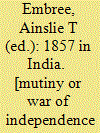

|
|
|
|
|
| Publication |
Lexington, D C Heath & Co, 1963.
|
| Description |
xii, 101p.pbk
|
| Series |
Problems in Asian Civilizations
|
|
|
|
|
|
|
|
|
|
|
|
Copies: C:1/I:0,R:0,Q:0
Circulation
| Accession# | Call# | Current Location | Status | Policy | Location |
| 008995 | 954.0317/EMB 008995 | Main | On Shelf | General | |
|
|
|
|
| 2 |
ID:
146840
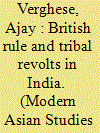

|
|
|
|
|
| Summary/Abstract |
British colonial rule in India precipitated a period of intense rebellion among the country's indigenous groups. Most tribal conflicts occurred in the British provinces, and many historians have documented how a host of colonial policies gave rise to widespread rural unrest and violence. In the post-independence period, many of the colonial-era policies that had caused revolt were not reformed, and tribal conflict continued in the form of the Naxalite insurgency. This article considers why the princely state of Bastar has continuously been a major centre of tribal conflict in India. Why has this small and remote kingdom, which never came under direct British rule, suffered so much bloodshed? Using extensive archival material, this article highlights two key findings: first, that Bastar experienced high levels of British intervention during the colonial period, which constituted the primary cause of tribal violence in the state; and second, that the post-independence Indian government has not reformed colonial policies in this region, ensuring a continuation and escalation of tribal conflict through the modern Naxalite movement.
|
|
|
|
|
|
|
|
|
|
|
|
|
|
|
|
| 3 |
ID:
140315
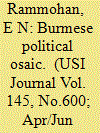

|
|
|
| 4 |
ID:
128070
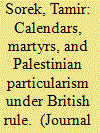

|
|
|
|
|
| Publication |
2014.
|
| Summary/Abstract |
This article explores how political calendars and shared martyrology provided
important markers of identity and symbolic tools for political mobilization in
Mandate Palestine. The dates on the emerging Palestinian calendar grew out of
the politicization and nationalization of traditional holy days, as well as the
commemoration of politically significant events of the period, including those
involving local Palestinian martyrs.
|
|
|
|
|
|
|
|
|
|
|
|
|
|
|
|
| 5 |
ID:
169990
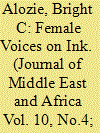

|
|
|
|
|
| Summary/Abstract |
While historians have, of course, employed a host of documentary sources in reconstructing the colonial history of Nigeria, few have used petitions to understand the dynamic negotiations that occurred between the colonizer and the colonized. As a result, a vital primary source of history has been underutilized. Likewise, the voices of women lamentably have suffered the same fate as the use of petitions. This study seeks to fill this important gap by examining selected petitions and written correspondence between Igbo women and British officials in the period from 1892 to 1960. Continuously undermined by male-dominated colonial institutions and structures, African women acted in varied and complex manners from subtle to overt opposition, and sometimes violent resistance. One response was through petition-writing as women took to the pen to articulate their concerns. Petitioning became both a disabling and enabling force in exploring the relationship between subjectivity and power relations. How are scholars to understand the interactions between the often-neglected, ordinary female subjects and the British authorities? To what extent did their petitions shift the balance of patriarchal power and give voice to the otherwise “silent” women? Analysis of petitions written by women in colonial Igboland demonstrates how petition-writing gave females a subtle yet powerful voice, or agency, in a rigidly hierarchical colonial political system. This study argues that instead of simply looking at these petitions as another set of documents, they should be regarded as unique sources in which colonial subjects’ thoughts and desires are revealed. In addition, these neglected sources should be treated as an integral part of the complex power politics among colonial subjects as well as between them and officials. In thinking through these petitions, this case study reframes the sexual politics of petitions and challenges dominant, institutionalized gender ideologies that have defined women as nearly powerless and passive.
|
|
|
|
|
|
|
|
|
|
|
|
|
|
|
|
| 6 |
ID:
047665
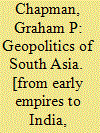

|
|
|
|
|
| Publication |
Aldershot, Ashgate, 2000.
|
| Description |
xxi, 338p.
|
| Standard Number |
0754613518
|
|
|
|
|
|
|
|
|
|
|
|
Copies: C:1/I:0,R:0,Q:0
Circulation
| Accession# | Call# | Current Location | Status | Policy | Location |
| 043631 | 320.120954/CHA 043631 | Main | On Shelf | General | |
|
|
|
|
| 7 |
ID:
029726
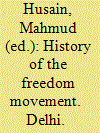

|
|
|
|
|
| Publication |
DelhI, Renaissance Publishing House, 1984.
|
| Description |
x, 601p.Hbk
|
| Contents |
Vol.II: 1831-1904 (Part-II)
|
|
|
|
|
|
|
|
|
|
|
|
Copies: C:1/I:0,R:0,Q:0
Circulation
| Accession# | Call# | Current Location | Status | Policy | Location |
| 024339 | 954/HUS 024339 | Main | On Shelf | General | |
|
|
|
|
| 8 |
ID:
044137
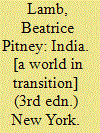

|
|
|
|
|
| Edition |
3rd edn.
|
| Publication |
New York, Praeger Publisher, 1968.
|
| Description |
xii, 428p.: bib., map.hbk
|
|
|
|
|
|
|
|
|
|
|
|
Copies: C:1/I:0,R:0,Q:0
Circulation
| Accession# | Call# | Current Location | Status | Policy | Location |
| 015738 | 954.04/LAM 015738 | Main | On Shelf | General | |
|
|
|
|
| 9 |
ID:
140006
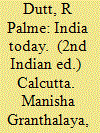

|
|
|
|
|
| Edition |
2nd Indian ed.
|
| Publication |
Calcutta, Manisha Granthalaya, 1970.
|
| Description |
xxii, 662p.hbk
|
|
|
|
|
|
|
|
|
|
|
|
Copies: C:1/I:0,R:0,Q:0
Circulation
| Accession# | Call# | Current Location | Status | Policy | Location |
| 005056 | 954.0359/DUT 005056 | Main | On Shelf | General | |
|
|
|
|
| 10 |
ID:
117188
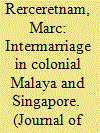

|
|
|
|
|
| Publication |
2012.
|
| Summary/Abstract |
Colonial race relations are regularly portrayed in light of the attempts to divide and rule colonialised Asian communities. While this article does not challenge this view, it attempts to uncover a hitherto hidden level of interaction and even intermarriage at the grassroots level in colonial Malaya and Singapore. With the exception of the various Peranakan communities that predated British rule, little to no evidence exists to show that interaction and especially intermarriage existed within early first- and second-generation migrant communities during the British colonial period. The findings show how colonial attempts to encourage a heightened sense of race and its frailties may have fallen short among some sections of the Asian community.
|
|
|
|
|
|
|
|
|
|
|
|
|
|
|
|
| 11 |
ID:
105283
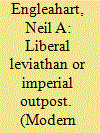

|
|
|
|
|
| Publication |
2011.
|
| Summary/Abstract |
J. S. Furnivall, in his influential account of the impact of British rule in Burma 1824-1948, argues that British officials laid down a Liberal administration that exposed the colony to market forces, monetized the economy and devastated communities. However, there is little evidence that British administrators actually thought in Liberal terms: they relied heavily on institutions inherited from the Burmese monarchy, and when they introduced new administrative methods these were drawn from other parts of British India and only indirectly influenced by Liberalism. Furnivall's view of the ideological origins of British administration, in turn, distorts his reading of the impact of British rule, as illustrated by recent work on the pre-colonial economy showing that it was in fact more monetized and commercialized than he claims. If his account of the pre-modern economy is not viable, Furnivall's claims about the impact of British colonialism in Burma demand re-evaluation.
|
|
|
|
|
|
|
|
|
|
|
|
|
|
|
|
| 12 |
ID:
121449
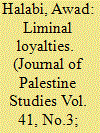

|
|
|
|
|
| Publication |
2012.
|
| Summary/Abstract |
The imposition of British rule in Palestine following World War I did not immediately supplant one imperial system with another or Ottoman identities with national ones. Examining Palestinian responses to the Turkish war of independence, this article argues that the 1917-22 period should be seen as a "liminal" era suspended between imperial systems. Both Kemalists and Palestinians employed a discourse of loyalty to the Ottoman dynasty, Muslim identity, and resistance to European rule to frame their goals. It was only after the creation of the Turkish Republic and the promulgation of the British Mandate, the author argues, that nationalist identities displaced Ottoman ones for both Turks and Palestinians.
|
|
|
|
|
|
|
|
|
|
|
|
|
|
|
|
| 13 |
ID:
050833
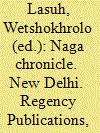

|
|
|
|
|
| Publication |
New Delhi, Regency Publications, 2002.
|
| Description |
xx, 637p.hbk
|
| Standard Number |
8187498625
|
|
|
|
|
|
|
|
|
|
|
|
Copies: C:1/I:0,R:0,Q:0
Circulation
| Accession# | Call# | Current Location | Status | Policy | Location |
| 047836 | 954.165/LAS 047836 | Main | On Shelf | General | |
|
|
|
|
| 14 |
ID:
135090
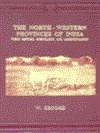

|
|
|
|
|
| Publication |
New Delhi, Asian educational services, 1998.
|
| Description |
x, 361p.Hbk
|
| Contents |
Old Publication
|
| Standard Number |
8120610679
|
|
|
|
|
|
|
|
|
|
|
|
Copies: C:1/I:0,R:0,Q:0
Circulation
| Accession# | Call# | Current Location | Status | Policy | Location |
| 057983 | 915.42/CRO 057983 | Main | On Shelf | General | |
|
|
|
|
| 15 |
ID:
030758
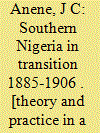

|
|
|
|
|
| Publication |
London, Cambridge University Press, 1966.
|
| Description |
xii, 360p.hbk
|
|
|
|
|
|
|
|
|
|
|
|
Copies: C:1/I:0,R:0,Q:0
Circulation
| Accession# | Call# | Current Location | Status | Policy | Location |
| 020152 | 966.903/ANE 020152 | Main | On Shelf | General | |
|
|
|
|
| 16 |
ID:
028067
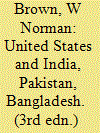

|
|
|
|
|
| Edition |
3rd edn.
|
| Publication |
Cambridge, Harvard University Press, 1972.
|
| Description |
xi, 462p.hbk
|
| Series |
American Foreign Policy Library
|
|
|
|
|
|
|
|
|
|
|
|
Copies: C:1/I:1,R:0,Q:0
Circulation
| Accession# | Call# | Current Location | Status | Policy | Location | IssuedTo | DueOn |
| 011691 | 954/BRO 011691 | Main | Issued | General | | RF096 | 10-Aug-2023 |
|
|
|
|
| 17 |
ID:
143313
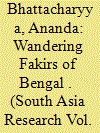

|
|
|
|
|
| Summary/Abstract |
The historiography of the Fakir rebellion has drawn much attention since Ghosh in 1930 depicted the Fakirs as raiders from outside Bengal. In independent India, two groups of ideology-driven historians, Marxists and Secularists, expounded the uprising as an early peasant rebellion and a shining example of Hindu–Muslim campaign against the Raj. This article explodes both scholarly myths, since its archival research reconfirms that the Fakirs were increasingly aggressive plunderers in religious garb, tormenting the Bengal countryside. Mainly based on colonial records, later parts of this article illustrate how and why the British felt increasingly compelled to curtail Fakir movements and activities.
|
|
|
|
|
|
|
|
|
|
|
|
|
|
|
|
|
|
|
|
|